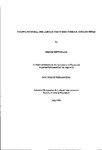Hugh Gaitskell, the Labour Party and foreign affairs 1955-63
| dc.contributor.author | Rippingale, Simon | |
| dc.contributor.other | Faculty of Arts, Humanities and Business | en_US |
| dc.date.accessioned | 2013-11-18T13:07:51Z | |
| dc.date.available | 2013-11-18T13:07:51Z | |
| dc.date.issued | 1996 | |
| dc.identifier | NOT AVAILABLE | en_US |
| dc.identifier.uri | http://hdl.handle.net/10026.1/2728 | |
| dc.description | Merged with duplicate record 10026.1/840 on 13.03.2017 by CS (TIS) | |
| dc.description.abstract |
Hugh Gaitskell was leader of the Labour Party between 1955-63. The Cold War was at a critical level and bi-partisanship in international affairs was expected. With Gaitskell's accession this appeared to end, marked in particular by the disputes over Suez, the independent nuclear deterrent and Britain's application to join the European Economic Community. Simultaneously, he was challenged by the Left over nearly every aspect of Labour's foreign and defence policy. Despite these major controversies, Gaitskell's influence over international affairs remains a neglected area of research, and he is remembered more for the domestic controversies over nationalisation, his ill-fated attempt to revise Clause IV and defeat at the 1960 Scarborough conference. This thesis addresses that imbalance by examining Gaitskell's contribution to foreign affairs and the following inter-related areas: bi-partisanship; policy formulation; internal divisions and the power struggle between Left and Right. In addition, it also considers how the structure of the Labour Party benefited the leadership during this turbulent period. The conclusions revise Gaitskell's reputation as a figure of unyielding principle, and demonstrates that his leadership was marked by a mixture of finesse and blunder. His responsibility for the end of bi-partisanship can be discounted, as Labour remained firmly committed to the policies laid down and followed since 1945. Yet, the personal control over policy that he exercised, allied to his determination to mould the Labour Party in his own image, needlessly accelerated the internal struggles for power. While the Scarborough defeat illustrates the limitations of his authority, Suez and Europe display his acute political awareness of the requirements needed to balance national interests, electoral prospects and maintain party unity. | en_US |
| dc.language.iso | en | en_US |
| dc.publisher | University of Plymouth | en_US |
| dc.title | Hugh Gaitskell, the Labour Party and foreign affairs 1955-63 | en_US |
| dc.type | Thesis | |
| plymouth.version | Full version | en_US |
| dc.identifier.doi | http://dx.doi.org/10.24382/1428 |
Files in this item
This item appears in the following Collection(s)
-
01 Research Theses Main Collection
Research Theses Main


